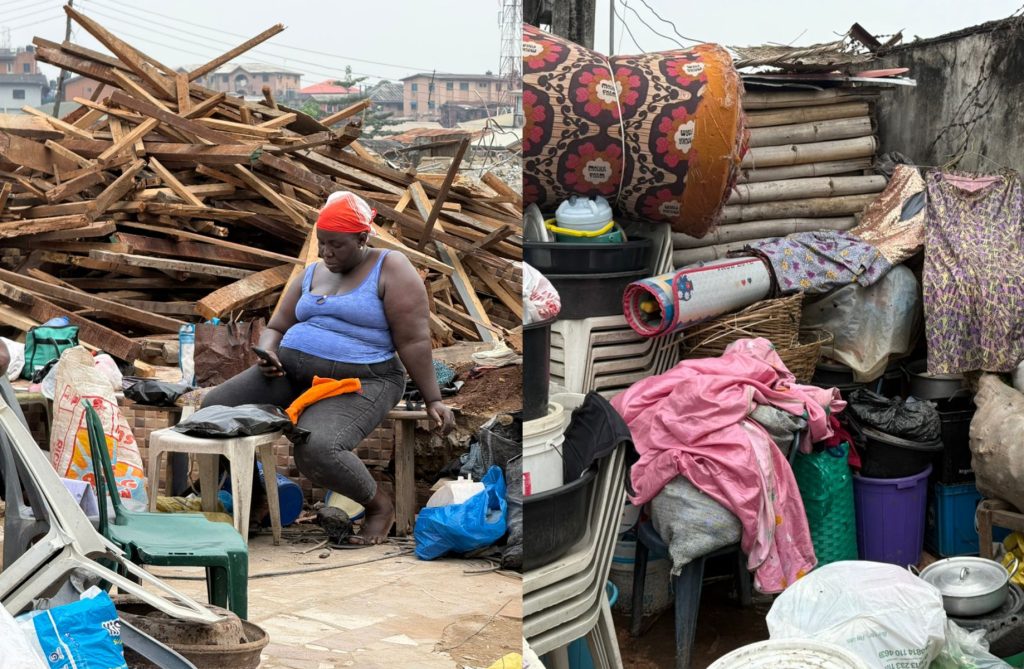By Efe Onodjae
Days after the Lagos State Government’s midnight demolition of waterfront settlements in Tolu Alashe Street, Oworonshoki, many residents, mostly women and children, are still stranded in the open, with no shelter and no hope in sight.
When Vanguard revisited the area on Wednesday, the once-busy community had turned into a rubble field. Broken blocks, scattered roofing sheets, and abandoned household items littered the dusty paths where hundreds of families once lived and traded. Belongings were seen outside, with some of the women, tearful, sourcing small items to sell.
Among those seen sitting helplessly by the roadside was Mrs. Rebecca, a mother of one, who said she was contemplating suicide after losing her home, shop, and savings to the demolition.
“I just came back from the hospital,” she began weakly, sitting beside a rusted pot and an old standing fan. “I have a problem with my spinal cord, so after little treatment i returned home that night if i can sell few things before my two months old rented house was demolished. I paid N360,000 for my two-room apartment. I just finished paying when they came at night and broke everything. I wanted to drink poison and die, but my sister stopped me.”
Rebecca, who sold cooked food before the incident, said she had begun selling her few remaining belongings, including her fan, to Hausa scrap buyers (“aboki”) for as low as N1,000, just to feed and raise money for rent.
“I bought that fan N35,000, but the aboki said N1,000. I don’t have a choice,” she said tearfully. “I need money to eat, to treat myself. Everywhere I turn, there is no help.” Vanguard noticed abokis all over the Vicinity negotiating with some of the women about the price of their goods.
Another victim, Mrs. Jumai, who had lived in the community for ten years, narrated how she and her children narrowly escaped the demolition night.
“They came around 11pm,” she said. “We were sleeping when our neighbours started shouting that the bulldozers were close. We carried what we could and ran out. My house and my shop where I sell pepper soup and drinks were in the same compound. They broke everything.”
Jumai said both her children’s school and her home were pulled down. “We stayed here with the school; everything is gone. I don’t even know where to start their schooling again,” she lamented.
Grace Manu, another mother of two, said her children’s education had been disrupted and that her small vegetable trade had been destroyed.
“I sell cucumber and garden egg, but they’re all spoilt now,” she said, showing her damaged goods. “Since last week, I’ve not sold anything. Even to get where to sleep is hard. I have gone to Magodo and Ogba to look for house, but rent is a million plus. Where do I see that kind of money?”
Nearby, Filomena, who has lived in the demolished settlement for eight years, now sleeps with her children under a makeshift tent made of old nets.
“They demolished the school where my children attend,” she said. “We don’t have anywhere to go. I just sleep here with my three children. Nobody came to talk to us , not government, not traditional rulers.”
When Vanguard visited the nearby palace to interview the chiefs, some guards, in Yoruba, were instructed not to allow our correspondent in. From the gate, our correspondent returned.
The Lagos State Government had earlier said the exercise was aimed at reclaiming right-of-way and clearing illegal structures along the waterfront. But for the displaced women and children, the demolition has left them battling hunger, homelessness, and trauma.
The post Tears, hunger, lost hope: Oworonshoki women now sell off their belongings for penny appeared first on Vanguard News.

